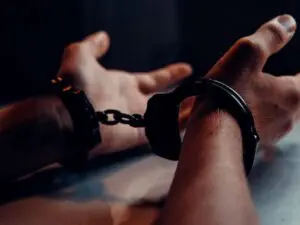Besides ruining your physical and mental health, drug and alcohol abuse can land you in legal hot water in many different ways. We’re talking about anything from a citation for disorderly conduct to felony manslaughter or worse.
And while you’re probably convinced you have enough control over your substance use not to cross that line, crime statistics tell a different story.
Of the roughly 1.7 million people in prison, 65% of them have an active substance use disorder (SUD), and an additional 20% were reported to be under the influence of drugs or alcohol when they were arrested. That’s 1.4 million offenders who didn’t count on ending up behind bars because of the substances they used or abused.
It gets worse. The National Institute on Drug Abuse also reports that only a small percentage of those who suffer from addiction receive adequate treatment in prison.
That’s not to say you don’t have other rehab options once you’re convicted of a crime. The nation has around 3,500 drug courts, serving juvenile, adult, and family populations. These specialty courts put offenders into mandated community drug or alcohol treatment. If they successfully finish the program, the judge will either expunge their convictions or dramatically reduce the penalties they face.
However, since court-mandated services vary from state to state and often don’t address co-occurring mental health issues, criminal recidivism, and substance relapse rates remain relatively significant. Roughly 40% of drug court participants interviewed for the National Institute of Justice’s Adult Drug Court Evaluation reported engaging in criminal activity the year before the study, and 56% reported using drugs during the same period.
The Key Takeaway – You or your loved one is far better off getting into a substance abuse rehab program before the law gets involved. You’ll have more control over your recovery and better, individualized options, such as dual diagnosis care, faith-based drug rehab, or gender-specific services.

(Kindel Media/Pexels)
Truth and Consequences
Now that we see how closely crime correlates with substance abuse, let’s look at some of the addiction’s more specific legal ramifications. Generally, drug and alcohol crimes fall into five main categories:
- Possession or sale
- Obtaining (e.g., stealing money to buy drugs, forging prescriptions, etc.)
- Accessory (e.g., claiming the alcohol as your own if the driver is drinking and then pulled over, etc.)
- Substance-related physical and sexual assault
- Damage to people and property while intoxicated
The penalties for crimes committed in each category vary from state to state. Still, you can usually count on hefty fines, jail time, temporary loss of privileges (like your driver’s license), damage costs, and legal fees.
Your Budget Can’t Afford It
Fines from citations, tickets, and other infractions can add up fast. For example, a penalty for disorderly conduct can total up to $1000. Traffic tickets and DUIs can cost you hundreds and even thousands of dollars. And if you’re involved in a bar brawl, you may have to pay a pretty penny to fix everything you and your opponent wrecked.
Getting arrested and going to jail will also cost you lost time from work and court and lawyer fees. If you lose your driving privileges with a DUI, you’ll have to spend money on public transit or private ride-share services to get around.
Last but certainly not least, substance abuse can keep you from paying your bills, placing you in legal trouble with banks and creditors. As a result, you could lose all your possessions and end up in serious debt.
Your Employment Options Will Dwindle
More often than not, companies tend to shy away from hiring ex-offenders because if the person commits another crime while employed with them, they could face serious legal repercussions. Some states have laws making it illegal to deny employment based solely on a prior conviction, but those cases can be hard to prove. In addition, federal job discrimination protections for ex-criminals do not yet exist.
In many cases, existing laws will go so far as to restrict a prior offender from working in specific fields. For example, if you have a narcotics offense or a felony child abuse conviction, you won’t be allowed to apply for a teaching job in certain states.
Note the Americans with Disabilities Act prevents companies from discriminating against you based on a previous substance addiction.
You Could Lose Your Kids
It’s tough to remain close to your children from a jail cell. And if you’re behind bars for domestic violence, child abuse, or any other dangerous or violent crime, the courts could bar you from ever seeing them again.
A criminal history alone does not make you ineligible for custody when you transition back into free society, but it does make the overall process much more complex. You will have your work cut out to prove you are a reliable and safe parent.
Ultimately, while it’s better to seek help from addiction professionals right away if you have a problem, the rest of your life is not wasted because you went to jail. One of the 12 Steps to recovery involves making restitution for the mistakes you made while in your addiction. Paying your debt to society is undoubtedly a form of restitution.
As a Christian-based treatment center, we believe that part of that restitution process is seeking forgiveness from God, the ones you hurt, and, ultimately, yourself. No matter what you have done, God can forgive, heal, and help you move forward.
If you are struggling with addiction or know someone who is, consider contacting one of our recovery professionals at 855-736-7262.
